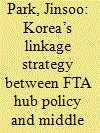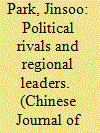| Srl | Item |
| 1 |
ID:
145000


|
|
|
|
|
| Summary/Abstract |
This article focuses on Korea’s free trade agreement (FTA) hub policy and its implication for Korea’s role in the regional integration process of the Asia-Pacific. It particularly bridges a gap in the existing literature, addressing why Korea, pursuing an FTA hub nation, simultaneously takes a proactive approach toward a range of regional projects. It argues that Korea’s FTA hub policy has not been solely driven by economic consideration, and the Korean government’s intent to use an FTA hub status to gain political objectives is equally, or even more, important. In particular, Korea has linked its FTA hub policy and the exercise of middle power leadership in the shaping of the regional trade architecture. The Korean government has perceived Korea’s FTA hub status as a useful instrument for Korea’s leading roles such as facilitating regional trade liberalization, managing its manners and sequence, and mediating between the USA-led and the China-led regional initiatives.
|
|
|
|
|
|
|
|
|
|
|
|
|
|
|
|
| 2 |
ID:
120152


|
|
|
|
|
| Publication |
2013.
|
| Summary/Abstract |
This article argues that the dual identities of political rivals and regional leaders have been of critical importance in determining China and Japan's regional policies and their bilateral relations within East Asian cooperation. China and Japan, in identifying each other as political rivals rather than cooperative partners, have defined their interests in regional cooperative projects, particularly those led by the other party, in terms of power politics. At the same time, China and Japan's efforts to gain followers' acceptance of their aspired leadership identities have shaped their regional policy options and behaviours. The combination effects of these dual identities have produced variances in China and Japan's regional policies and their bilateral relations within East Asian financial and institutional cooperation. Particularly with regards to regional projects led by the other party and supported by a majority of followers, China and Japan cooperated with the intention of neutralizing the other's dominance in the region and to demonstrate the responsibilities one should assume as aspirant regional leader. China or Japan opposed, in terms of power politics, cooperative projects the other party initiated that did not secure majority support among followers, instead promoting their own initiatives to expand followers' acceptance of their leadership.
|
|
|
|
|
|
|
|
|
|
|
|
|
|
|
|